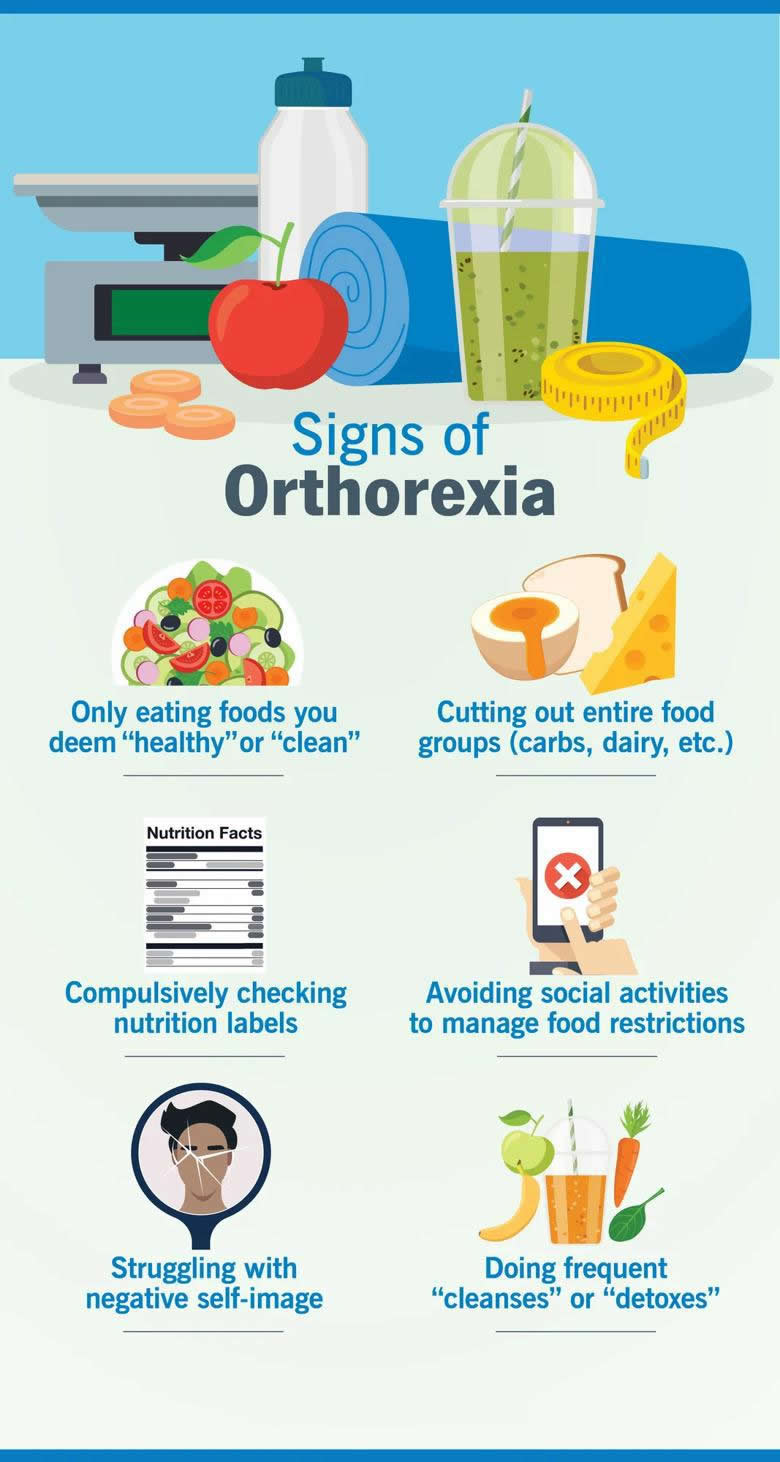Orthorexia: When Healthy Eating Goes Too Far
An obsession with eating ‘clean’ or ‘healthy’ can be both physically and emotionally damaging

In general, it’s good to follow a balanced diet. But sometimes, being so focused on your health can swing in the opposite direction — and become harmful to both your body and mind.
Psychologist Kasey Goodpaster, PhD, explains what orthorexia nervosa is and what treatments may help.
What is orthorexia?
Orthorexia nervosa is a pathological obsession with eating “clean” or “healthy” foods. People who have this condition focus on their diet so strictly (and so restrictively) that it takes both a physical and mental toll.
The name comes from the English ortho, meaning “proper,” and orexia, Latin for “appetite.” Nervosa is Latin for something that relates to the nervous system, causing mental and emotional distress.
Behaviors associated with orthorexia typically include:
- Engaging in restrictive or ritualized eating behaviors.
- Creating and strictly following rules about which foods are and are not healthy.
- Feeling guilty and anxious when confronted with foods that don’t fit these rules.
“These behaviors share many characteristics with anorexia nervosa,” Dr. Goodpaster says. “The difference is that people living with anorexia restrict the quantity of the food they eat, whereas people living with orthorexia focus on the quality of the food.”
Though orthorexia is often referred to as an eating disorder, it isn’t listed in the DSM-5, the manual that mental health providers use to diagnose mental health conditions (including eating disorders). More and more research is being done on this condition, though, and it’s acknowledged by the National Eating Disorders Association.
Orthorexia symptoms

Because it’s not an officially recognized eating disorder, it’s hard to define where, exactly, healthy eating ends and an obsessive fixation on nutrition begins. But based on existing research compiled by the National Eating Disorders Association and others, here’s a look at behaviors that may point to orthorexia:
- You won’t (or feel that you can’t) eat anything but the foods that you deem pure, clean or healthy.
- The list of foods you’ll eat keeps getting shorter as you increasingly nix entire food groups, like all sugar, carbs, dairy, etc.
- You grow more and more worried about certain ingredients or products.
- Before eating anything, you compulsively check nutrition labels and ingredient lists.
- You become distraught when foods you perceive as healthy or “safe” aren’t available to you.
- You spend a significant amount of time worrying about what food will be available at events or in other scenarios where you don’t have control over the menu.
- You’re highly interested in what others are eating and how healthy you perceive it to be.
- You obsessively follow “healthy lifestyle” news and accounts on social media so that you can keep up with new developments and information.
- Your obsession with food starts to have social consequences, like causing you to feel anxious or panicky around other people and avoid social activities.
- You have body image concerns, like struggling with a negative perception of your body.
- You frequently do “cleanses” or “detoxes” to rid your body of perceived toxins.
“The line between a commitment to healthy eating and orthorexia lies with the ability (or inability) to practice moderation, and whether the drive to eat healthily creates distress,” Dr. Goodpaster explains.
How orthorexia can affect your life
Living with an eating disorder can be both physically and emotionally damaging, negatively impacting your quality of life. Some of the effects of orthorexia can include:
- Malnutrition:Eliminating entire food groups and severely restricting the types of foods you eat can lead to malnutrition, like an overall lack of calories or vitamin and mineral deficiencies.
- Medical complications:Malnutrition and extreme weight loss from orthorexia can cause issues like bone density loss (osteopenia), low levels of healthy blood cells (anemia and pancytopenia), low sodium levels (hyponatremia), slow heartbeat (bradycardia) and collapsed lung (pneumothorax).
- Overeating:“Eliminating entire food groups, like sugar, only increases cravings,” Dr. Goodpaster points out. “Then, when a person living with orthorexia inevitably breaks their restraint and eats the food they’ve restricted, they often feel such intense guilt and shame that it prompts them to overeat.”
- Feelings of guilt and shame: Restricting and overeating can become a vicious cycle that brings a constant battery of self-destructive emotions. “After overeating, the cycle begins all over again,” Dr. Goodpaster says, “because breaking your food rules causes even more guilt and shame.”
- Loss of time and energy: Constantly thinking about and preparing “safe” foods can take up a significant amount of time and effort — leaving you with less time for other important parts of your life.
- Social consequences: Sharing meals is a universal way that humans spend quality time with each other. Following overly strict eating rules with no flexibility can cause social isolation and emotional distress.
Causes and risk factors
Anyone can develop an eating disorder. But you may be at higher risk for orthorexia nervosa if you have a history of:
- Other eating disorders
- Disordered eating habits
- Picky eating
- Certain personality traits, like perfectionism or a need for control
- A mental health condition like generalized anxiety disorder (GAD) or obsessive-compulsive disorder (OCD)
- Obesity
“The obsession with ‘clean’ eating seems to be another manifestation of our diet culture, in which there is a heavy emphasis on thinness often masked by a desire for health,” Dr. Goodpaster notes.
Research agrees. As one study puts it, “Constant exposure to curated images of seemingly ‘perfect’ bodies and ‘healthy’ eating habits can create an environment that normalizes extreme dieting and reinforces that adhering to strict dietary rules is the key to achieving health and success.”
How to overcome orthorexia
There aren’t many studies that evaluate the effectiveness of treatments for orthorexia. But experts say cognitive behavioral therapy (CBT) may help, especially an approach called “exposure and response prevention” that aims to reduce eating-related obsessions. It has been proven effective for conditions like OCD.
This type of therapy involves slowly reintroducing you to foods you fear, while a trained therapist helps you learn to recognize and redirect your intrusive thoughts about food. They can also teach intuitive eating principles and mindfulness strategies.
“Eating is so complex that it’s downright impossible to be perfect,” Dr. Goodpaster recognizes. “A healthier and more sustainable lifestyle comes from learning to recognize that deviating from your intentions to eat in a particular manner is completely normal — and not a sign of personal failure.”
If you or someone you know shows signs of orthorexia, talk with a healthcare provider about your concerns.